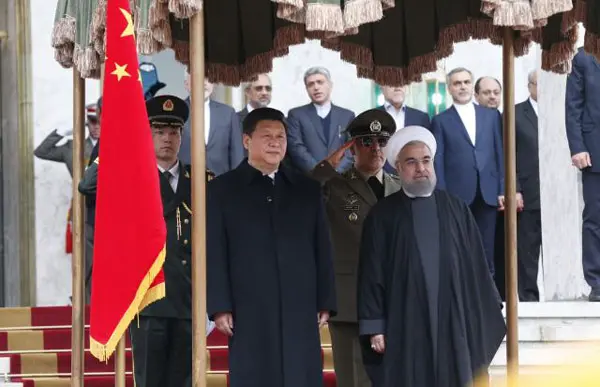Chinese President Xi Jinping (L front) attends a grand welcome ceremony before talks with Iranian President Hassan Rouhani (R front) in Tehran, Iran, Jan. 23, 2016.
Iran, historically known as Persia, had been playing a key role at the linkage of the East and the West on the ancient Silk Road. In history, both China and Iran made important contributions to opening the Silk Road and promoting exchanges between Eastern and Western civilizations.
Despite a glorious history behind China and Iran, with the subsequent appearance and rise of the Sea-Trade, the role of land-bridges such as Iran in the world trade gradually diminished. With China’s Belt and Road initiative, countries alongside the route have seen the chance to once again play a much more important significant role in the world trade.
“Thanks to the development of increasingly efficient land transportation of the region, which is going to once again revive the land-based flow of trade and resources,” said Seyed Javad Hosseini, the Iranian Sinology researcher, “countries as Iran will have the chance to once again play significant role in the world trade and find new, viable trade and economic options and bringing them new possibilities and outlooks."
According to historical records, more than 2,000 years ago during the West Han Dynasty (206 BC – 25 AD), the Chinese envoy Zhang Qian’s deputy visited Iran and received warm welcome. In the 15th century, Chinese Ming Dynasty (1368-1644) navigator Zheng He led seven maritime expeditions overseas, which took him to Hormuz in southern Iran three times.
The renowned Persian carpet is a combination of China’s quality silk and Iran’s sophisticated techniques. And the exquisite blue and white porcelain is produced with Iran’s "smaltum" (a type of material containing cobalt, unique to Iran) and China’s excellent skills. China’s lacquerware, pottery, as well as papermaking, metallurgical, printing and gunpowder making skills were spread to the west Asia and Europe through Iran. And from Iran and Europe, pomegranate, grape, olive, glass, gold and silver ware were introduced into China.
China and Iran established diplomatic ties in 1971. In 2013, Chinese President Xi Jinping put forward the proposal of jointly building the Silk Road Economic Belt and the 21st Century Maritime Silk Road, which received positive response from Iran.
Hosseini said, China has shown great leadership by the timely proposal of the "Belt and Road". “China has proposed the idea that can ideally shape the third major economic zone in the world that will be land-based in contrast with the two sea-based Atlantic and Asia-Pacific zones that have been prone to interference of extra-regional powers in regional affairs,” he said, “and this idea can be extremely attractive to countries like Iran that have been struggling to maintain their independence and national sovereignty in a world of increasing grouping and regionalism.”
As an important stop on the Silk Road, Iran uniquely links up the land and sea routes of the "Belt and Road" in a loop. At the same time, rich resources of gas and oil as well as the preferential investment environment make Iran an attractive place to consider for production and distribution.
Isfahan's Imam Square is designated by UNESCO as a World Heritage Site
The Iranian cities to participate in this year’s forum, namely Qazvin and Isfahan, are historical cities situated on the Ancient Silk Road and the B&R as well. Both of them served as capitals of Iran in the past. The representatives and officials from the two cities will explore the possibilities of bilateral and multilateral exchanges with other participating cities as well as introducing their own potentials and attractions.
Hosseini said that Iran and China learnt much from each other in the past and now China’s experience can benefit Iran and other countries. “China’s great achievements and transformation during the past four decades inspire Iran to have more confidence in the path of independence they have chosen,” he said, “also, China’s rich experiences accumulated during many years of hard work can doubtlessly benefit Iran and other countries.”
 简体中文
简体中文

